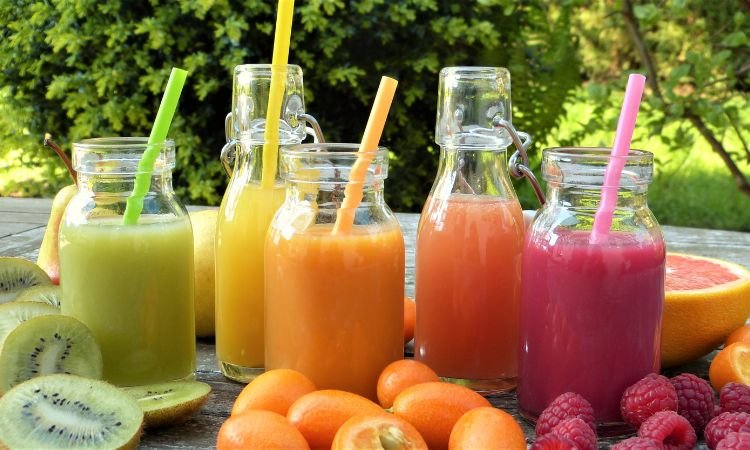
Fruit Juice Market Overview
The global fruit juice market is a rapidly growing sector of the beverages industry, driven by increasing health-conscious consumer preferences and the rising demand for natural and organic products. Fruit juices, derived from a wide range of fruits, are rich in essential vitamins, minerals, and antioxidants. These health benefits make them a popular alternative to sugary soft drinks and artificial beverages. The market includes a diverse array of products, from 100% fruit juices to juice concentrates and blends. The fruit juice market is expected to witness steady growth over the next decade, supported by evolving lifestyle trends and growing disposable incomes.
Fruit Juice Market Size
In 2023, the global fruit juice market reached a valuation of approximately USD 150.52 billion. This market size reflects strong demand for fruit-based beverages across regions like North America, Europe, and Asia-Pacific. Consumers are increasingly seeking convenient, nutritious, and ready-to-drink products, fueling market growth. With rising awareness about the health benefits of fruit juice consumption, particularly post-pandemic, the market is poised for sustained expansion. Projections indicate that by 2032, the market will grow at a compound annual growth rate (CAGR) of 5.2%, reaching around USD 237.54 billion. Key drivers include product innovations and the growing availability of organic and fortified juice varieties.
Fruit Juice Market Share
The fruit juice market is highly competitive, with significant market share dominated by key players like The Coca-Cola Company, Tropicana Products, Inc., and Del Monte Food, Inc. These companies account for a large portion of the global market, thanks to their vast distribution networks and extensive product portfolios. Additionally, local and regional players contribute to market diversity by offering niche products such as organic, cold-pressed, and exotic fruit juices. North America and Europe hold substantial shares due to high consumption rates and premiumization trends, while the Asia-Pacific region is emerging as a significant player, driven by population growth and rising disposable incomes.
Fruit Juice Market Trends
- Health and Wellness Focus: Consumers are increasingly opting for healthier beverages, leading to a surge in demand for organic, no-sugar-added, and functional fruit juices enriched with vitamins and minerals.
- Premiumization: There is growing interest in premium juices, particularly cold-pressed and fresh-squeezed varieties, which preserve more nutrients and natural flavors.
- Sustainability Initiatives: Sustainable packaging solutions, including biodegradable and eco-friendly materials, are gaining traction as brands aim to reduce their environmental impact.
- Exotic Flavors and Blends: The introduction of exotic fruit juices such as dragon fruit, açai, and goji berries is helping to diversify product offerings and attract a wider consumer base.
- Increased Consumption of Fortified Juices: Juices fortified with added vitamins, minerals, and probiotics are becoming popular as consumers look for beverages that offer additional health benefits.
Fruit Juice Market Analysis
The fruit juice market is experiencing robust growth due to a combination of health-conscious consumer behavior, product innovation, and technological advancements in juice processing and packaging. The increased focus on health and wellness has shifted consumer preferences from sugary carbonated beverages to more nutritious fruit-based drinks. Additionally, the premiumization trend is further boosting the market, with consumers willing to pay a premium for fresh, organic, and cold-pressed juices. Technological improvements, such as High Pressure Processing (HPP), have enabled brands to extend the shelf life of juices without compromising on nutritional content.
Another critical aspect of market analysis is the rise of functional juices, where manufacturers fortify juices with added benefits like fiber, antioxidants, or probiotics to appeal to health-conscious consumers. Regional analysis shows North America and Europe as the dominant markets due to higher disposable incomes and health awareness, while Asia-Pacific is emerging as a growth hub driven by urbanization and increasing middle-class consumption.
Get a Free Sample Report with Table of Contents
Fruit Juice Market Segmentation
- By Product Type:
- 100% Fruit Juices: Pure juices with no added sugar or preservatives.
- Juice Concentrates: Processed juices with water removed, requiring dilution before consumption.
- Blended Juices: Mixes of different fruit juices or fruit and vegetable blends.
- Powdered Juices: Dehydrated forms of juices that require reconstitution with water.
- By Distribution Channel:
- Supermarkets/Hypermarkets: Major retail outlets that offer a wide range of fruit juice products.
- Convenience Stores: Smaller stores that provide on-the-go consumption options.
- Online Retail: E-commerce platforms, including direct-to-consumer sales from juice brands.
- Specialty Stores: Organic or health-focused stores that sell niche fruit juice products like cold-pressed juices.
- By Packaging Type:
- Bottles: Glass or plastic packaging, often used for single servings or larger multi-serving bottles.
- Cans: Aluminum cans, often used for juice blends and ready-to-drink products.
- Cartons: Tetra packs, commonly used for 100% juices and concentrates.
- Pouches: Flexible packaging used primarily for kids’ juices and portable consumption.
- By Region:
- North America: Dominates the market with a focus on premium and functional beverages.
- Europe: Second-largest market, with high demand for organic and low-calorie fruit juices.
- Asia-Pacific: Fast-growing market due to population growth, urbanization, and rising health awareness.
- Latin America and Middle East & Africa: Emerging markets with growth potential, driven by increasing demand for healthy beverages.
Fruit Juice Market Growth
The fruit juice market is projected to experience steady growth with a 5.2% CAGR during the forecast period of 2024-2032. This growth can be attributed to the increasing awareness of the health benefits of fruit juices and the rising consumer demand for natural and organic products. Additionally, the expansion of distribution networks and the availability of innovative flavors and blends are further contributing to market growth. Growing economies in regions like Asia-Pacific and Latin America are also playing a pivotal role in market expansion, as urbanization and higher disposable incomes boost demand for convenient and nutritious beverages.
Recent Developments and Challenges in the Fruit Juice Market
Recent Developments:
- Sustainability in Packaging: Companies are shifting towards eco-friendly packaging solutions such as biodegradable bottles and cartons to cater to environmentally conscious consumers. Brands like Tropicana and Del Monte are leading initiatives in this area.
- Functional Beverages: There has been an increase in fortified fruit juices that offer additional health benefits. These include juices enriched with probiotics, fiber, and added vitamins like Vitamin C and D.
- Product Innovations: The introduction of new exotic flavors and blends, such as dragon fruit, acerola cherry, and pomegranate, is driving consumer interest and expanding the market’s product offerings.
- E-commerce Expansion: The growth of online retail platforms has made it easier for consumers to access a wide variety of fruit juice products. Many brands are now offering direct-to-consumer options through their websites and mobile apps.
Challenges:
- High Sugar Content: Despite being perceived as a healthy alternative, some fruit juices are high in natural sugars, which can pose health concerns. This has led to increased scrutiny from health organizations and regulators.
- Rising Costs of Raw Materials: The fluctuating prices of fruits due to climate change, supply chain disruptions, and agricultural issues can impact production costs, thereby affecting the price of fruit juices.
- Competition from Plant-Based and Functional Beverages: While fruit juice remains popular, it faces growing competition from other health-focused beverages such as plant-based drinks, smoothies, and kombucha.
- Regulatory Changes: Governments and health bodies are increasingly imposing regulations related to sugar content, labeling, and advertising, which may impact market strategies and product formulations.
Key Players in the Fruit Juice Market
The fruit juice market features several prominent players that are shaping the industry’s future. Some of the key companies include:
- Del Monte Food, Inc.: A leading producer of packaged fruit, vegetables, and beverages, Del Monte is renowned for its diverse range of fruit juice products, including 100% juices and juice blends.
- Parle Agro Private Limited: Known for its popular Frooti brand, Parle Agro is a significant player in the Indian fruit juice market, specializing in mango-based juices and fruit drinks.
- Ocean Spray Cranberries, Inc.: A cooperative of cranberry growers, Ocean Spray is a leading global supplier of cranberry-based fruit juices, offering products that promote health benefits such as urinary tract health.
- Apple & Eve, LLC: A pioneer in producing organic and 100% fruit juices, Apple & Eve focuses on providing natural and healthy juice products, with a strong presence in the U.S. market.
- Langer Juice Company: Known for its wide range of fruit juice products, Langer specializes in high-quality, family-owned production and distribution, offering both traditional and exotic juice varieties.
- Pioneer Foods (Pty) Ltd: This South African-based company offers a wide range of beverages, including fruit juices, catering to both local and international markets.
- Campbell Soup Company: Through its V8 brand, Campbell offers vegetable and fruit juice blends that cater to health-conscious consumers looking for low-calorie, nutrient-rich beverages.
- The Coca-Cola Company: A global leader in the beverage industry, Coca-Cola’s portfolio includes popular fruit juice brands such as Minute Maid and Simply Orange, making it a dominant player in the global fruit juice market.
- Tropicana Products, Inc.: One of the most recognized names in the fruit juice industry, Tropicana offers a wide range of 100% fruit juices, juice blends, and premium products like cold-pressed juices.
- Prodalim B.V: A leading supplier of fruit juice concentrates, Prodalim serves both the industrial and retail markets with a variety of juice and juice-based products.
- Citrofrut: A Mexican company specializing in the production and export of citrus juices and concentrates, Citrofrut is a significant player in the global fruit juice supply chain.
- The Archer-Daniels-Midland Company: ADM is involved in the production of fruit-based ingredients and concentrates, catering to the growing demand for natural, organic, and functional beverages.
- Döhler GmbH: A global producer of technology-driven food and beverage solutions, Döhler provides juice concentrates and innovative juice blends to the market.
- Ventura Coastal, LLC: A significant player in the U.S. fruit juice industry, Ventura Coastal focuses on citrus-based juices, supplying both retail and industrial customers.
- Rauch Fruchtsäfte GmbH & Co OG: A leading European fruit juice manufacturer, Rauch offers a wide range of juices, nectars, and fruit-based drinks, with a strong presence in international markets.
- Eckes-Granini Group GmbH: A family-owned business, Eckes-Granini is one of Europe’s leading fruit juice producers, known for brands such as Granini and Pago.
- Dabur Ltd: An Indian multinational, Dabur is a significant player in the fruit juice segment, offering products under its popular brand Real, which focuses on natural and healthy juice beverages.
Thanks for allowing guest posting https://webexplore.co.uk/




